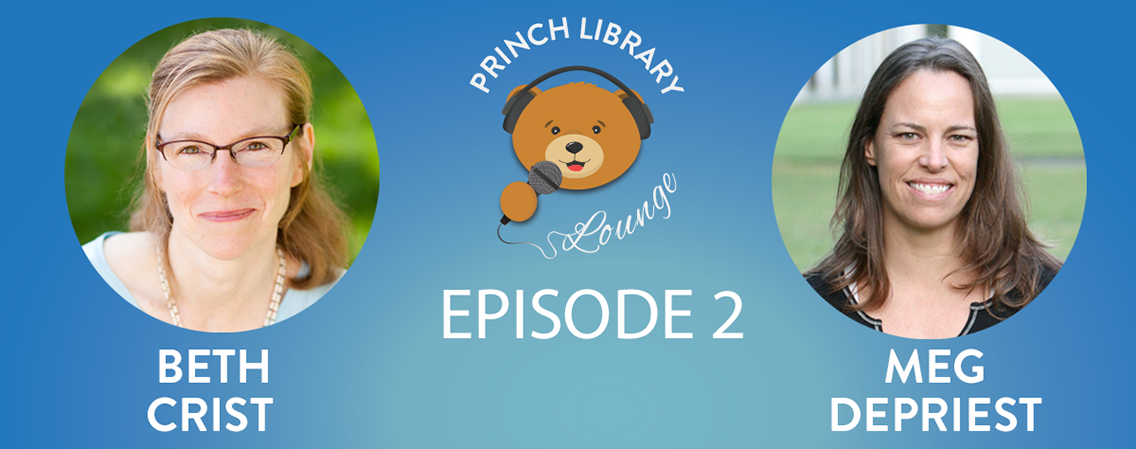Listen in your favourite player
Should library fines be abolished? Are they a vital source of revenue for libraries, or do they do more harm than good? Are they in line with the mission of libraries, or are they contradictory to it?
You can find the answer to these and many other questions in episode two of the Princh Library Lounge! In this episode our host, Vicky Woolbarn, is joined by Beth Crist and Meg DePriest, two experts on the topic of library fines.
Library fines have been one of the most talked about topics in recent years in the library world. Some say they are vital, and some say they should not exist. On what side of the fence are our guests on?
Meg starts the discussion by defining the difference between two key terms in this topic; library fines and library fees. Library fines are the charges that occur when the materials are not returned on time. They tend to start out small, but grow bigger day by day, until your account gets banned. On the other hand, library fees are when patrons must pay if they have damaged or lost borrowed items. Fees can also refer to the money charged for using the copy machine/printer. The conversation in this podcast will solely be about fines.
Beth adds that libraries tend to charge late fines for three main reasons; to bring in revenue, to ensure that people bring materials back on time and to teach responsibility. However, research found that in practice, they did not accomplish the above-mentioned reasons.
Throughout their research, they found that library fines are a barrier for those who need the services the most.
To learn how exactly library fines are a barrier for potential patrons, listen to the Princh Library Lounge Episode 2.
Some libraries may want to go fine free, but because of budget cuts they are afraid to lose this source of revenue. How would you address this problem and what can these libraries do?
Beth states that while this is a concern that is voiced quite often, library fines are just not a reliable source of income. Through her research, she found that fines only make up about an average of 1% of the libraries’ overall operating budget.
Meg draws attention to the costs associated with collecting fines, both monetary and mental. Credit card fees, post price, agency fees, and so on, can easily add up to a higher value than the fine is. Also, enforcing these fines on patrons is quite stressful and communicates a negative message towards the library visitors.
Also, enforcing these fines on patrons is quite stressful and communicates a negative message towards the library visitors. Share on XDo you think libraries are tasked with teaching responsibility?
Beth gives a clear and straightforward answer; no. Children, kids or teens are often unable to return books on their own, thus they are penalized for something that they cannot do.
Meg quotes a whitepaper made by the San Francisco Public Library: “Responsibility is an important value for individuals and communities to practice, but not one that permits the library to overlook it’s essential function. If there is a conflict between teaching responsibility and ensuring equal access, the library is duty bound to prioritize equal access.”
Do you have research that shows eliminating library fines helps with getting library materials back in circulation in a timely manner?
Based on research conducted in North Carolina on the circulation of libraries with and without fines, Meg states that there appeared to be no difference between the two. The rate of late returns was the same for libraries without fines or if the amount was small. There was an affect when libraries charged steep fines.
Beth refers to some libraries that have gone fine-free recently. They generally report that they have roughly the same amount of materials returned, and in some cases, their circulation has actually improved.
Meg expands on this research by stating that in some cases the circulation of children materials have gone up by as much as 16% when fines have been eliminated.
Meg expands on this research by stating that in some cases the circulation of children materials have gone up by as much as 16% when fines have been eliminated. Share on XDo you think that the fine-free movement will affect academic libraries as well?
Meg refers to research done by academic libraries which studied students’ borrowing behaviour. The research focused on the different outcomes that small fines, larger fines, no fines and even the presence of a reward would have on students. The study came to a conclusion that might be surprising to some. There was no effect in borrowing behaviour when rewards or punitive measures were implemented.
Going back to public libraries, could you tell us more about your research in the US about the connection between library fines and circulation rates?
Beth explains the results of their study that in Salt Lake City Library (Utah), both the number of borrowers and checkouts have increased by 10%, while South San Rafael Public Library (California) have found that their youth borrowers have almost doubled after abolishing late fines.
The research also shows that libraries tend to have the lowest number of borrowers in disadvantaged areas, where library fines are posing a great barrier for the people wishing to use libraries.
Beth also draws attention to endlibraryfines.info, a website showing all the fine-free libraries around the world and urges those who are part of this movement to join this community.
Final question: what would you recommend for librarians who are advocating to make their libraries fine-free? How should they go about pursuing this?
Beth would recommend trying to eliminate fines first on only certain sections, e.g. children’s books. Track the circulation of materials, number of borrowers and number of library visitors unable to check out an item because something was not returned on time for 6-12 months. Once you have the data to prove that fines are either ineffective or just a barrier, convincing your colleagues and board-members is easier.
Meg suggests that another great practice is creating infographics and visuals before presenting the idea to your governing body. Also, take your library’s budget, user demographics, your areas’ economic situation and the costs of collecting fines into consideration.
The American Library Association published a resolution in January, stating that monetary fines are a form of social inequity.
For more tips and tricks on how to make your library fine-free and to find out more about the new resolution by the ALA, listen to episode 2 of the Princh Library Lounge!
Finally, in case our guests have any questions regarding this topic, where can they reach out to you?
Beth: crist_b@cde.state.co.us
Resources used
● Blog article “Eliminating library fines” by Beth Crist and Med Depriest
● Blog article “Doing away with fines ” by George M. Eberhart, American Library Magazine
● Article “For and against library fines ” by Alison Flood, The Guardian
● Website “End library fines”
● Article “An overdue discussion – Two takes on the library-fine debate” by Phil Morehart, American Library Magazine
Subscribe to the blog and receive news from libraries around the world














